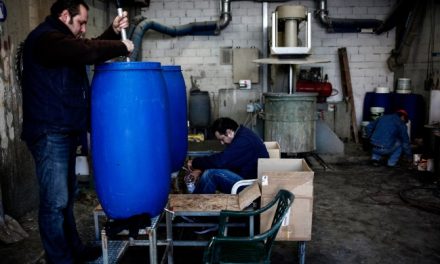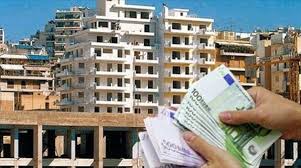Since 2010, the Total Number of Private Businesses in Greece Dropped by More than 20%
By Matthew Karnitschnig and Nektaria Stamouli, Wall Street Journal
ATHENS—After years of struggling through Greece’s financial crisis, Nikos Vasiliou’s Athens-based lighting company finally began to see signs of a turnaround in 2014.
The relief was short-lived.
A radical leftist party that came to power last month vowing to reverse the austerity forced on Greece by its creditors has reignited fears the country could separate from the euro. With Greece running out of money, the country’s new leadership has only a couple of weeks to reach a compromise.
Mr. Vasiliou’s clients, 60% of whom are outside Greece, are nervous again.
“They ask, What’s going to happen? Will you be able to give us our products,’” says Mr. Vasiliou, whose company, Bright Special Lighting SA, has 150 employees. “Why should they buy from Greece when they can go to neighboring countries with more stability?”
The political crisis playing out between Greece’s new, leftist government and its creditors threatens to throttle any business upturn. A weakening of the Greek economy would worsen the country’s fiscal position as tax receipts drop and increase its dependence on international assistance.
Greece’s depression, in which the economy contracted by more than 25%, began to abate last year with the return of modest growth. But late last year, as the country’s political course became less clear, key indicators started moving in the wrong direction. Corporate and consumer spending have declined. More worrying, Greece’s battered banks had an outflow of €8 billion to €10 billion ($11.3 billion) in deposits last month, according to government officials, and have been forced to seek emergency liquidity from the country’s central bank.
“A lot of clients were saying last year that the economy was improving in terms of sales and profits,” says Platon Monokroussos, chief market economist at Athens-based Eurobank. Now, he says, “there’s more uncertainty.”
Businesses complain that they either can’t get credit or that it is too expensive. As a result, they have been forced to hold off on investments, putting the economy in a holding pattern that could reverse recent progress. Since 2010, the total number of private businesses in Greece dropped by more than 20% to 740,000, according to the Athens Chamber of Commerce and Industry. The closures have devastated the labor market, with unemployment shooting up to more than 25%.
“The only way to exit this crisis is through the private sector,” says Constantine Michalos, the head of the chamber, adding that more businesses are likely to fail in the coming months if they can’t get credit.
“This is an extremely critical time,” he said.
Even Greece’s tourism sector, its largest industry, is starting to worry. Many European tour operators are finalizing their plans for the summer, but the political upheaval in Greece has forced delays. New hotel projects and other investment are also on hold.
“Many people are reconsidering investments,” says Andreas Andreadis, a hotelier who also heads the Greek Tourism Confederation. “They want to wait and see.”
Mr. Andreadis says there has been a “considerable drop” in the number of bookings by Germans, the largest group of visitors to Greece, in recent weeks.
Still, he says the season will be rescued if the Greek government resolves its conflict with Europe soon.
“We don’t talk about other scenarios because it is in no one’s interest,” he said.
Last year, a record 24 million people visited Greece, 20% more than in 2013. Violence in Northern Africa and the Middle East, coupled with lower prices, has made Greece a more attractive destination for many Europeans and a growing number of Americans.
The influx of visitors has been a godsend for the beleaguered Greek economy. Tourism now accounts for a quarter of Greece’s economy, up from 15% a few years ago, and employs a large chunk of the country’s workforce.
Greek industry has fewer natural advantages. Over the years, red tape, corruption and labor costs have prompted many Greek manufacturers to relocate to neighboring Bulgaria.
Mr. Vasiliou says he decided to keep making lights in Greece for “sentimental” reasons.
Founded 25 years ago, Bright is focused on interior lighting. It recently outfitted a number of new train stations in Saudi Arabia, including one in Mecca.
Despite the company’s track record, a number of clients were reluctant to keep doing business after Greece’s debt problems emerged. Sales plummeted from a peak of €25 million in 2008 to just €11 million in 2009. The company managed to keep all of its 150 workers but was forced to cut salaries.
To quiet client concerns, Mr. Vasiliou invited important customers to Athens, all expenses paid.
The overtures paid off. In 2014, Bright recorded €17.5 million in sales and Mr. Vasiliou says the company, which is private, remains profitable.
But now the jitters have returned. Mr. Vasiliou says customers have started refusing to make down payments on orders out of fear they won’t get their deliveries.
Other Greek companies complain that foreign suppliers have started to demand full upfront payment on all orders. With cash scarce and bank credit tight, many companies are facing difficulty funding their daily operations.
If things don’t improve soon, Mr. Vasiliou says he would be forced to reconsider relocating abroad.
“We have to survive somehow,” he said.



















